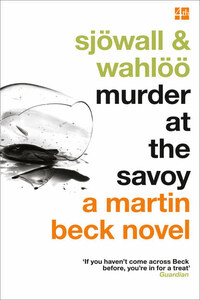This novel is entirely a work of fiction. The names, characters and incidents portrayed in it are the work of the authors' imagination. Any resemblance to actual persons living or dead, events or localities is entirely coincidental.
4th Estate
An imprint of HarperCollinsPublishers Ltd. 1 London Bridge Street London SE1 9GF
www.harpercollins.co.uk
This ebook first published by Harper Perennial in 2009
This 4th Estate edition published in 2016
This translation first published by Random House Inc, New York, in 1971
Originally published in Sweden by P. A. Norstedt & Söners Forlag
Copyright text © Maj Sjöwall and Per Wahlöö 1970
Copyright introduction © Arne Dahl 2009
Cover photograph © Shutterstock
PS Section © Richard Shephard 2007
PS™ is a trademark of HarperCollinsPublishers Ltd.
Maj Sjöwall and Per Wahlöö assert the moral right to be identified as the authors of this work
A catalogue record for this book is available from the British Library
All rights reserved under International and Pan-American Copyright Conventions. By payment of the required fees, you have been granted the nonexclusive, nontransferable right to access and read the text of this ebook on-screen. No part of this text may be reproduced, transmitted, downloaded, decompiled, reverse-engineered, or stored in or introduced into any information storage and retrieval system, in any form or by any means, whether electronic or mechanical, now known or hereinafter invented, without the express written permission of HarperCollins ebooks
HarperCollinsPublishers has made every reasonable effort to ensure that any picture content and written content in this ebook has been included or removed in accordance with the contractual and technological constraints in operation at the time of publication
Source ISBN: 9780007242962
Ebook Edition © DECEMBER 2013 ISBN: 9780007323432
Version: 2018-05-18
From the reviews of the Martin Beck series:
‘First class’
Daily Telegraph
‘One of the most authentic, gripping and profound collections of police procedural ever accomplished’
MICHAEL CONNELLY
‘Hauntingly effective storytelling’
New York Times
‘There's just no question about it: the reigning King and Queen of mystery fiction are Maj Sjöwall and her husband Per Wahlöö’
The National Observer
‘Sjöwall/Wahlöö are the best writers of police procedural in the world’
Birmingham Post
It’s unusual to be able to point to the actual parents of a literary tradition. It’s even more unusual when we speak of an entire genre. But that is actually the case for the Swedish crime fiction genre that is still the strongest today: the police procedural that has a perspective of social criticism. Before Maj Sjöwall and Per Wahlöö appeared on the scene, the Swedish detective novel looked completely different. With them all the naïveté of the classic murder mystery was irrevocably lost.
Almost all Swedish authors who write police procedurals have at one time or another been hailed as successors to Sjöwall and Wahlöö. In my case, it has happened rather more often than for other writers. And I have never objected. When people ask me about my role models, I usually say: Sjöwall and Wahlöö. This is the honest truth, even though in life I’m generally not particularly dependent on role models – whether I sink or swim, I believe in going my own way. It’s always better for an author to speak in his own voice.
Writers of detective novels are almost always expected to say that they don’t read detective novels. And I have tended to live up to these expectations. When I took my first stumbling steps towards writing crime fiction nearly a decade ago, I could in all honesty say: I don’t read detective novels.
But it wasn’t always like that. In fact, I readily admit that the very opposite was true. The books that I read as an adolescent were to an absurdly high degree based on suspense fiction: nail-biting cliffhangers, action stories, classic murder mysteries, spy thrillers – you name it. I read absolutely everything that contained even the slightest hint of suspense.
You might well ask when the adolescent mind is at its most receptive, at which age in particular and under which mental conditions the most indelible impressions are made. Fifteen is a strong candidate. It could be deemed the most manic-depressive age in anyone’s life. On the one hand, life seems an almost incessant torment; on the other hand, you are starting to realize who you are and, in spite of everything, what possibilities life has to offer.
Sjöwall and Wahlöö came into my life after I had actually given up all those childish suspense books. And so I was ready for completely different literary impressions (precociously ready, that is). But when those two authors appeared, not only did they make use of all the various suspense traditions in which I had immersed myself, they also added two elements that I had been missing up until then: humour and a critical view of contemporary society.









